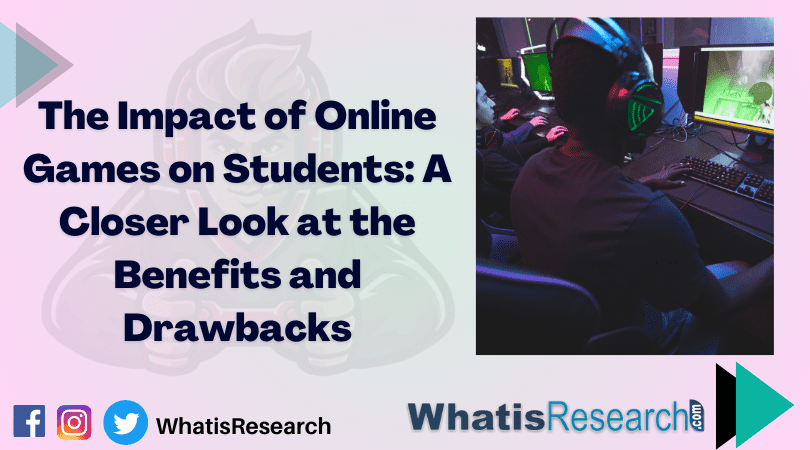In the fast-paced digital age, online games have become an integral part of the entertainment landscape. From immersive multiplayer experiences to educational platforms, the gaming industry has evolved significantly. Here we will discuss the The Impact of Online Games on Students: A Closer Look at the Benefits and Drawbacks.
The Impact of Online Games on Students: A Closer Look at the Benefits and Drawbacks
As parents and educators grapple with concerns about screen time and its potential effects on students, it’s essential to explore the question: Are online games good for students?
In this article, we’ll delve into the various aspects of online gaming, considering both the positive and
negative impacts. Before we dive in, let’s take a moment to highlight the importance of balancing recreational activities with other aspects of life and take advice from Top Rated Home Products that
contribute to a conducive environment for learning and leisure.
The Educational Potential of Online Games
Online games, when chosen wisely, can offer a range of educational benefits for students. Many games
are designed to enhance cognitive skills such as problem-solving, critical thinking, and strategic planning.
For instance, puzzle games stimulate the brain, encouraging students to analyze situations and devise
solutions. Additionally, some educational platforms seamlessly integrate subjects like mathematics,
science, and language arts into gameplay, making learning a fun and interactive experience.
Building Social Skills in a Digital Realm
One of the noteworthy advantages of online gaming is the opportunity for students to develop and
refine their social skills. Multiplayer games, in particular, foster collaboration and teamwork, as players
must communicate effectively to achieve common goals. These virtual environments provide a unique
space for students to interact with peers from diverse backgrounds, promoting cultural awareness and
empathy.
Screen Time Concerns and Health Implications
While the educational and social benefits of online games are evident, it’s crucial to address the potential drawbacks, particularly concerning screen time. Excessive screen time has been linked to various health concerns, including eye strain, disrupted sleep patterns, and sedentary behavior. To mitigate these risks, parents and educators need to establish reasonable time limits for gaming and encourage a balance between online activities and other forms of recreation.
Must read: Web of Science My Research Assistant app
Creating a Conducive Gaming Environment
To ensure a positive gaming experience for students, it’s vital to create a conducive environment at home. Investing in home products, such as ergonomic chairs, adjustable desks, and proper lighting, can contribute to a comfortable and healthy gaming setup. These products not only enhance the overall gaming experience but also support students’ well-being by promoting good posture and reducing the
risk of physical discomfort associated with prolonged periods of gameplay.
Enhanced Problem-Solving Skills
Online games often present complex challenges that require quick thinking and effective problem- Solving. Students engaged in games that involve puzzles, strategy, and critical decision-making can develop and sharpen their problem-solving skills, translating these abilities into academic and real-world
scenarios.
Must read: The benefits of playing online games
Technological Literacy and Adaptability
In an era dominated by technology, exposure to online games can contribute to improved technological literacy among students. Navigating gaming interfaces, troubleshooting technical issues, and adapting to frequent updates are skills that can prove valuable in an increasingly digital world.
Time Management and Discipline
Responsible gaming requires effective time management and discipline. Students who learn to balance
their gaming activities with other responsibilities, such as homework and chores, can develop essential
time management skills that are transferable to various aspects of their lives.
Exposure to Diverse Cultures and Perspectives
Many online games feature diverse virtual worlds and characters, exposing students to different cultures and perspectives. This exposure can contribute to the development of cultural competence and global awareness, fostering an appreciation for diversity.
Risk of Addiction and Distraction
It’s important to acknowledge the potential risks associated with excessive gaming. Students may be at
risk of developing gaming addiction, which can negatively impact academic performance and overall well-being. Additionally, constant engagement in online games may lead to distractions, affecting students’ focus on other essential tasks and responsibilities
Conclusion: Striking a Balance for Student Well-being
In conclusion, the impact of online games on students is multifaceted, with both positive and negative aspects to consider. By selecting educational and age-appropriate games, establishing reasonable screen time limits, and creating a conducive gaming environment with top-rated home products, parents and educators can help students enjoy the benefits of online gaming while minimizing potential drawbacks. Striking a balance between digital engagement and other activities is key to supporting the overall well-
being of students in today’s technology-driven world.
Balancing the positive aspects with potential challenges is crucial in forming a well-rounded perspective on the impact of online games on students. Parents, educators, and students themselves can work collaboratively to maximize the benefits while addressing and mitigating any potential drawbacks.
Must read: Positive effects of online games on the growth of college students: A qualitative study from China
Join our telegram channel for Latest News and Updates Click here






